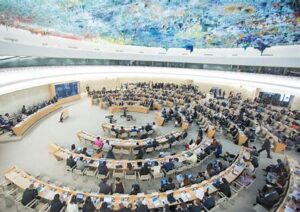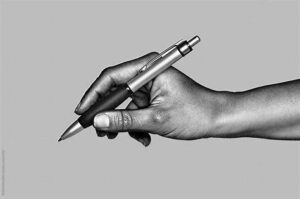This blog post is co-authored by Unite for Rights staff, including Joshua Cooper, United Nations Director, and Shannon Landheer, Program Director.
Joshua has spent nearly 30 years working with United Nations human rights mechanisms, including numerous UPR sessions where he has collaborated with civil society organizations in their UPR advocacy.
Shannon supported the UN Committee on the Rights of Persons with Disabilities during its 2022 UPR, informing recommendations for states’ compliance with the CRPD.
Both are deeply committed to connecting Unite’s work with UN mechanisms like the UPR to strengthen global human rights protections and accountability.
The United Nations has been grounded in a vision of universal human rights since its inception. From the UN Charter to the Universal Declaration of Human Rights (UDHR) and beyond, the global community has worked to define, develop, and deliver human rights for all. One of the most powerful mechanisms for advancing this vision today is the Universal Periodic Review (UPR), a unique process through which the UN Human Rights Council reviews the human rights record of every member state.

As the fourth UPR cycle gets underway, including a review of the United States, we have a critical opportunity to reflect, organize, and act – not just as governments, but as people. The UPR is a chance for communities, classrooms, local and national leaders, and civil society to come together to hold governments accountable and advocate for a better future. This moment aligns deeply with our mission at Unite for Rights: to help make human rights real, enforceable, and accessible to everyone, everywhere.
The Power of the UPR
The UPR is more than a bureaucratic review. It’s a people-powered, participatory process that gathers grassroots voices to raise the realities of rights denied, and the hopes for rights fulfilled.
Every four to five years, each of the UN’s 193 Member States is reviewed on its human rights record to highlight progress, identify gaps, and generate recommendations for improvement. This review is conducted by fellow states, but its strength comes from the contributions of civil society, who can submit detailed reports, shape the review, propose recommendations, and push for accountability.
The UPR is a powerful mechanism because it gives people a direct route to the international stage. It connects local injustices to global attention. And while the UPR doesn’t have enforcement power, it generates diplomatic pressure and public accountability. This is a powerful reminder that accountability works — and that it can be strengthened.
How Unite for Rights Engages with the UPR
At Unite for Rights, we see the UPR as a valuable tool for collective pressure and engagement. Our goal is to use this platform to support and enhance the broader global human rights ecosystem, and to help lay the foundation for something even more powerful: an enforceable International Bill of Rights (IBOR).
We recognize that the UPR provides a structure for international engagement and pressure, and we believe our work, particularly around regional courts, can complement and amplify the progress made through the UPR. That’s why for every UPR, Unite for Rights will submit tailored comments, grounded in our commitment to human rights enforcement:
- For countries already part of a regional human rights court system:
We will commend their participation and urge them to support the strengthening and expansion of regional courts in Africa, the Americas, and beyond so that every country can be part of a regional court. - For countries within a regional court system but not fully engaging with its jurisdiction:
We will urge them to acknowledge and accept the jurisdiction of a regional court over their domestic courts, and support broader regional cooperation and development. - For countries outside any regional court system:
We will encourage them to support the creation of a regional court for their region and engage with it meaningfully.
We also advocate for every country to ratify all core UN human rights treaties, including optional protocols that allow for complaints and investigations. Moreover, we urge governments to enforce recommendations from treaty body reviews and decisions from optional protocol mechanisms. We emphasize, however, that these treaties have proven to be inadequate when it comes to enforcement, and regional court systems should be simultaneously strengthened and expanded.
Drafting, Dialogue, and Strategic Alignment
There’s a strong alignment between the UPR and our Drafting Through Dialogue program, which engages people around the world to draft together an International Bill of Rights.

Both the UPR and Unite center on inclusive participation, diverse perspectives, and a shared commitment to dignity and justice. The UPR fosters global engagement , and Unite is working to build on that momentum to create enforceable mechanisms, courts, for human rights accountability. The international community needs more courts and fewer reports.
The UPR also shows us that mobilizing civil society and amplifying grassroots voices can push governments to change. We believe our regional court strategy – enforcing rights through judicial mechanisms – can turn UPR soft pressure into binding protections. The UPR creates the roadmap; Unite helps lay down the pavement.
An Invitation to Collaborate
Unite for Rights is excited to be an active partner in the UPR process. We’re lucky to have our UN Director, Joshua Cooper, leading this engagement with passion and expertise.
We also extend an open invitation to all 46 thematic UN Human Rights Council Special Procedures, including Special Rapporteurs, Independent Experts, and Working Groups, to collaborate and engage with us. Together, we can strengthen the link between international human rights norms and real-world enforcement.
Now is the time for action. Let’s build on the UPR to create lasting infrastructure for accountability. Let’s unite for rights — in every classroom, community, and country.


Leave a Reply